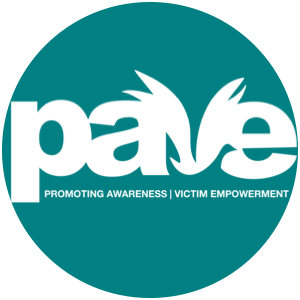Change the Shame: Dating App Violence
Although online dating is becoming more popular and accepted in our increasingly virtual world, there is still a stigma attached to online dating. This stigma alone can cause dating app users to feel hesitant or embarrassed about disclosing that they met someone online. Because of the stigma around online dating, dating app violence can leave survivors with unique feelings of shame and guilt. The stigma leads to silence which can further perpetuate the violence. Those who experience sexual violence from dating apps can feel as if they somehow asked for their assault by taking part in online dating, but through #TakeBackTheSwipe PAVE wants everyone to know that if you experience sexual violence, it is never your fault.
Survivors of sexual assault often blame themselves for the events that occurred. This leads to some survivors thinking that it was their fault for drinking, their fault for wearing a certain outfit, their fault for flirting, or in the case of online dating, their fault for using a dating app. Ultimately, these feelings of guilt and shame can have a negative impact on the mental health of survivors. According to Mental Health America, these feelings can even contribute to a survivor developing depression, PTSD, anxiety, an eating disorder, or substance use disorders. A survivor is never at fault for what happened to them, but it is human-nature to blame oneself. This sense of guilt along with trauma can have a detrimental effect on a survivor’s physical, mental, and emotional well-being.
Ultimately, there can be a unique sense of shame associated with being assaulted by someone from a dating app. A survivor who has chosen to remain anonymous, but consented to their story being shared, reached out to PAVE regarding their assault. They expressed that they are an activist who has been open about being a survivor but for a long time, they intentionally felt the need to hide the fact that their assault was perpetrated by someone they had met on a dating app. When the survivor did disclose to friends that the assault occurred from a dating app and that they had continued to use dating apps following the assault, they were met with victim blaming questions. They were asked, “what do you expect from an app like Tinder,” and, “why would you return to a dating app after being assaulted?” As if returning to a dating app is an invitation for assault to occur again. This anonymous survivor has a very important message for the #TakeBackTheSwipe campaign: “I remember feeling like maybe I would never have been assaulted if I hadn’t used a dating app in the first place. I wish my younger-self knew that it was not my fault for using a dating app. If you take anything away from the #TakeBackTheSwipe campaign I want you to know that if you have experienced sexual violence while using a dating app, it is not your fault and we all have a role to play in shattering the silence around dating app violence”
Whether intentional or not, victim blaming statements are extremely harmful to survivors. According to the National Institute of Justice, studies show that when a survivor discloses their story, the response of the person they disclose to has a powerful effect on the survivors’s mental health and healing journey. If someone discloses to you that they have experienced sexual violence from a dating app or in-person we encourage you to listen without judgment, to believe, support, and validate them. A good place to start in supporting survivors is to say phrases like, “I believe you,” “I’m here for you,” and “How can I best support you?”
If you are a survivor and find yourself struggling with shame, we want to help you change the shame. It’s important to remember that healing is a process that looks different for every survivor. Self-love and self-care are a key part of the healing journey as they allow you to support yourself physically and emotionally after a trauma. Practicing self-care can help you take steps forward to feel safe, healthy, and comfortable. RAINN states that physical self-care includes sleep, nutrition, and exercise which all allow you to keep your body strong and healthy. Additionally, RAINN describes emotional self-care allows you to be in-tune with yourself by spending time with people you feel supported by and doing activities that bring you joy and happiness. Practicing both physical and emotional self-care will be a useful tool to feel balanced as you heal.
Shattering the silence, breaking the stigma and changing the shame around dating app violence will allow us to better support all survivors of sexual violence mentally, emotionally, and physically. PAVE created the Take Back the Swipe campaign to raise awareness and educate in an effort to better support survivors. All survivors deserve support, including those from online dating. Together we can continue the conversation in shattering the silence, and taking back the swipe. If you or someone you know is in need of support or resources, PAVE is committed to helping all survivors of sexual violence.
